When Belfast Celtic stunned Scotland in the Big Apple
- Published
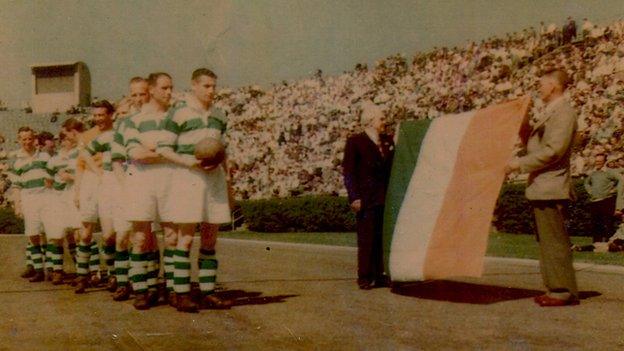
Elisha Scott (right) holding an Irish tricolour at the pre-match parade caused outcry in Belfast
In June 1948, 18,000 people came to New York's Ebbets Field, the home of the Brooklyn Dodgers, to watch a touring Liverpool team that included Scottish legend Billy Liddell beat Swedish club Djurgaden 3-2 in a friendly.
The United States Soccer Football Association and the American Soccer League organisations, keen to spread the message of soccer, saw an opportunity to raise the sport's profile.
On the world stage, Fifa wanted to get the World Cup up and running again after the cancellation of the tournament in 1942 and 1946. Brazil would host the 1950 finals and the USA would be taking part.
An international festival of football was proposed for May and June of 1949. It would include five 'dream' games to be staged at another baseball venue - Triborough Stadium. These would feature Ireland against the USA, Ireland versus Scotland, Sweden against Ireland, England versus Sweden and Scotland against the USA.
The Scottish FA agreed to send its international side. Newcastle United and Kamraterna, better known as IFK Göteborg, represented their associations. And Belfast Celtic, with the full blessing of the Irish FA, accepted its invitation to compete.
Offered a choice, the SFA decided to play Belfast Celtic instead of Newcastle or Göteborg. It would be a greater attraction to the Scottish and Irish diaspora in the land of opportunity.
The 22,000 capacity Triborough Stadium, situated on Randall's Island, had a good track record. Olympic champion Jesse Owens had drawn the crowds there 12 years earlier for the US athletics trials.
As the winter of 1948 moved into the spring of 1949, Belfast Celtic's board of directors faced a dilemma. The club's relationship with the Irish FA was fractured beyond repair.
Centre forward Jimmy Jones, the jewel in Celtic's crown, was sidelined with a broken right leg inflicted in a brutal attack by a section of the Linfield support at the end of the 1948 Boxing Day draw at Windsor Park. The skills of orthopaedic surgeon Jimmy Withers had been required to save the teenager's leg from amputation. A return, if any, to playing football would be a long way off.
In spite of condemnation from some horrified Linfield supporters clubs, the lack of a meaningful sanction from the Irish FA, or the authorities, for this serious assault left the Celtic board incandescent. While the club had a commitment to the transatlantic tour, it also wanted a reckoning. Secret plans were drawn up to sell off the Celtic's high value assets.
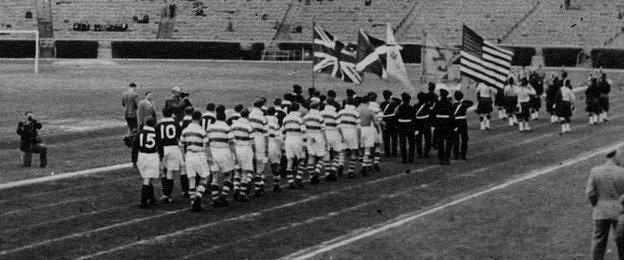
Scotland and Belfast Celtic at the pre-match parade
The club would then tender its resignation from the Irish League. This tactic, so effective during a four-year absence in the 1920s, was being tried again.
Winger Paddy Bonnar was transferred to Barnsley while centre-half Charlie Currie went to Bradford City. Full-back Tom 'Bud' Aherne joined Luton Town. Fulham signed forward Johnny Campbell and wing half Robin Lawler. The Cottagers attempts to sign 37-year old captain Harry Walker (uncle of future Irish centre Mike Gibson) unravelled in a dispute over the £3000 fee.
Those transfers included clauses to 'borrow' players back for the US tour. Celtic manager Elisha Scott, needing to supplement his squad, agreed short-term deals for Jimmy Murdough of Crusaders, Tom Dorman at Ards and Glenavon's Alex Moore - the Lurgan side's top scorer that season.
Johnny Denver, Kevin McAlinden, Joe Douglas, Billy McMillen, George Hazlett and Reggie Simpson, brother of Linfield's ace marksman Billy Simpson, completed the party that set out by train from Belfast on April 26th for the next day's transatlantic crossing from Cobh harbour in County Cork.
Mick O'Flanagan, the final addition to the Belfast Celtic party, was already in transit to New York when the SS Mauretania docked at berth 90 on the Hudson on 3 May.
The availability of the dual Ireland rugby and soccer international, who played for Lansdowne RFC and as an amateur with Bohemians, was limited. O'Flanagan worked in the family's pub business in Dublin and could not be absent for too long. Celtic flew him to America to save time.
Wining and dining in the 24-hour city
Although the flight required several stops along the route, it would have been preferable to the sea crossing. Heavy rolling seas caused a great deal of sickness among the 1000 passengers. Alex Moore was an exception.
Having served as a radio operator with the Norwegian navy on the North Atlantic convoy runs into Russia during World War Two, the 26-year old's sea legs kept him on an even keel.
Following demobilisation, Moore pursued his football career. A spell with hometown club Derry City opened the route into a full-time move to Glenavon where his lightning speed and 28 goals in 39 matches had brought him to the notice of the eagle-eyed Scott.
"I was so excited when Celtic wanted me to go to America with them," Moore told me some years ago when I was researching a book about his life. "It was like being asked by Arsenal or Manchester United or Liverpool."
"The club was incredibly generous to me. Apart from my pay and any bonuses, Celtic agreed to pay a £22 a week allowance to my wife Phyllis while I was away. That was big money then."
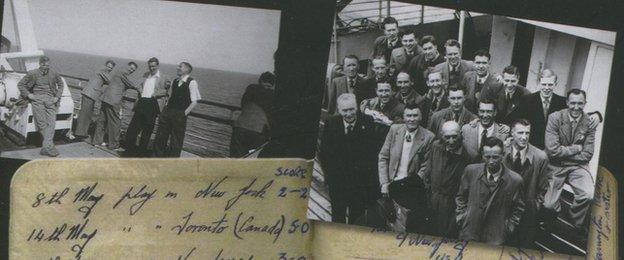
Alex Moore's story with Belfast Celtic has been covered in his memoirs
Celtic played five matches in the build-up to the clash with Scotland on 29 May. There were easy victories against Ulster United in Toronto (5-0), New Jersey Stars (3-0) and Philadelphia All-Stars (6-4).
The 2-2 draw with the New York All Stars and a 2-1 defeat against New England All-Stars at Fall River were attributable to acclimatisation and travel fatigue.
Belfast Celtic's visit to New York was given extensive press coverage. When a photograph showing Scott carrying off an Irish tricolour flag at the front of a pre-match parade found its way on to the pages of newspapers back in Belfast, there was quite a public outcry.
Scott and several Protestant members of the squad wrote an open letter explaining the circumstances.
Of the action on the field, Herman Mello, a sports reporter with the Herald News of Massachusetts, had an unusual turn of phrase in his coverage of a Celtic match. "There were three other flips that dropped in the goal area and forced the All-Stars to do some quick scurrying to nip the threat of a tying marker," he wrote.
Off the field, the squad was wined and dined by various Irish American organisations. No official reception seemed complete without the presentation of a cigarette lighter or a fountain pen. The bars and restaurants were thriving in post-war America. New York was a 24-hour city.
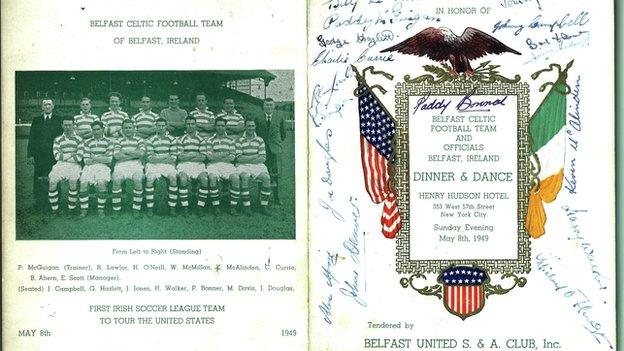
Belfast Celtic were the first Irish League team to tour the United States
Scotland also booked into the Paramount Hotel where the Belfast Celtic party was staying. The British champions arrived on the crest of a wave. Five wins on the bounce had installed them as firm favourites for the meeting with Scott's team.
Nearly 250,000 people had watched them beat Wales, Ireland and England in the Home International Championship. A Billy Steel double in the 2-0 friendly win against France in front of 126,000 supporters at Hampden Park was the perfect sign off to their American trip.
The opening match, a 6-0 defeat of St Louis in Missouri on 25 May, indicated that this end-of-season tour would not be too taxing. What could possibly go wrong?
George Hazlet, who knew most of the Scotland team from his time at Glasgow Celtic, helped in preparing Scott's tactics. In blustery, wet conditions in front of 15,000 people, Johnny Campbell scored the opener after 27 minutes and Moore's final touch for 2-0 after 55 minutes was enough to prove that the famous Scottish Iron Curtain defence was porous.
The Scots frustration at the Celtic tactics led to a major 'stramash' between Rangers' Willie Waddell and Mick O'Flanagan, while Glasgow Celtic's Bobby Evans picked the wrong man when he engaged with Aherne, a former Irish Army boxing champion.
'The most sensational day of my life'
As the teams made the return journey to the hotel, the Belfast Celtic sing-song on the teams shared coach must have grated on the vanquished Scots.
In his personal diary Moore remembered that epic occasion.
"Today has been the most sensational day of my life. The way the Scottish international team acted once they arrived at the hotel here, they would hardly speak to us," he wrote. "To play and score against them was something of a dream come true. After the game we were carried off the field not to mention the £25 bonus which we have to get for winning."
Pride dented, Scotland requested a quick rematch. This was turned down by the Belfast Celtic chairman Austin Donnelly. The Edinburgh Evening News' agency report the following day was light on detail of the loss. Celtic's "robust" tackling got a mention and there was reference to the fact that it was Scotland's first defeat "across the Atlantic since they were beaten at Toronto in 1927".
This would mark the last time that Scotland ever played a club side. For Mick O'Flanagan, there was the satisfaction of having been on the winning side against Scotland in two sports. He had played centre in the 6-0 result when Ireland claimed its first Grand Slam in 1948.
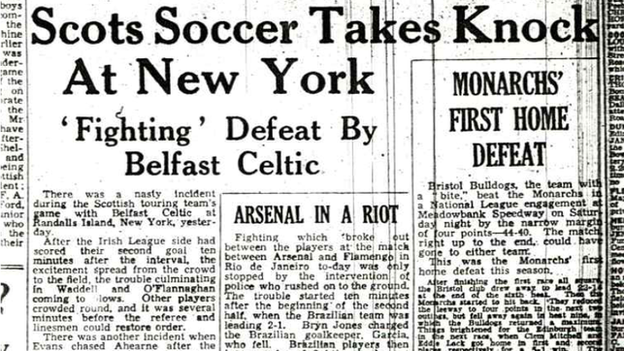
A New York newspaper report from the game
In the euphoria of the victory at Triborough Stadium, everything else that followed became a bit of an anti-climax for Belfast Celtic. It was known that the club had tendered its resignation from the Irish League. The letter had been posted a few days before leaving for America. A game of bluff seemed to be developing between Celtic and the Irish FA. The significance of the decision was lost on the America sports media.
At home there was little public debate. Celtic's support was in limbo. Players still on the club's books knew nothing. The board was damping down all speculation. On 14 June, two days after losing the final match against Kamaraterna, the Celtic party was sailing home to Belfast.
As the players, their families and supporters congregated at the arrival point at Great Northern Railway station on Tuesday 21 June, Alex Moore missed the reception. He was elsewhere having to explain undeclared presents in his luggage to His Majesty's Customs & Excise officers.
But for the delay in having to pay a fine of £21, 12 shillings and six pence, he might have witnessed chairman Austin Donnelly's reply to a press query about the club's future. "We have gone from the Irish League," he said.
Belfast Celtic's bluff had been called. Crusaders had been invited to take its place in the league for the forthcoming season. There would be no return for the club that topped off 59 league and cup triumphs with the scalp of the mighty Scotland.